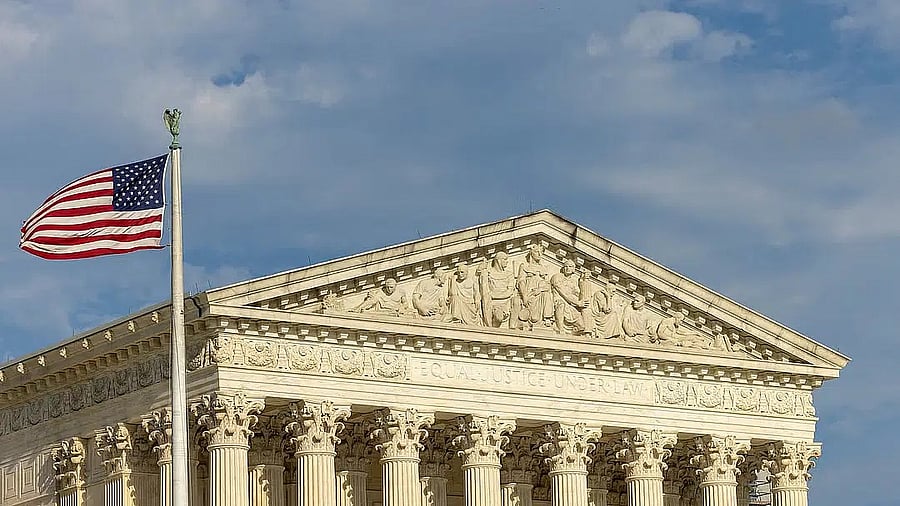
A view of the US Supreme Court in Washington.
Credit: Reuters Photo
By Noah Feldman
In a cavalier, under-reasoned two-page opinion, the Supreme Court announced its intention to overrule a century of precedent and roll back the existence of independent agencies, one of the linchpins of the modern administrative state. The president now has the authority to fire the head of any agency for virtually any reason — even when Congress has stipulated that such officials can only be dismissed for cause. While the court signaled that it would exempt the Federal Reserve from its new regime, we are witnessing a stunning conservative constitutional revolution. This shift undermines the foundational principle that certain government employees should be nonpartisan professionals hired for their expertise, not political loyalty.
The decision in Trump v. Wilcox did not follow the usual process of full briefing and oral argument — standard in even the most routine Supreme Court cases, let alone those that will be remembered as era-defining. Instead, it reached the justices through the court’s “emergency docket,” a fast-track process that takes place when parties seek urgent relief and the Supreme Court must decide whether emergency intervention is justified.
In the past, it would’ve been unthinkable for an opinion of such consequence to reach the court in this manner. But in a constitutional revolution, old rules are broken.
The narrow issue before the court was whether to block President Donald Trump from firing members of the National Labor Relations Board and the Merit Systems Protection Board. These are independent agencies in the classic sense that the law says their members can only be fired for good cause.
The precedent could not be clearer. Almost 100 years ago, on May 27, 1935, the Supreme Court decided Humphrey’s Executor v. United States, a landmark case that held the president lacked the authority to fire a member of the Federal Trade Commission — another independent agency protected by Congress.
Because Trump’s actions clearly violated precedent, lower courts issued emergency orders blocking him from proceeding. The administration then asked the Supreme Court to reverse those orders.
In an unsigned opinion, over the dissent of the court’s three liberal justices, the conservative majority granted that request. That alone signaled the court’s intent to overturn Humphrey’s Executor. But it went further, stating explicitly that the president “may remove without cause executive officers who exercise [executive] power on his behalf, subject to narrow exceptions.” The court said that the NLRB and Merit Board might be exceptions but that it didn’t expect them to be, so it removed the lower court orders in anticipation that the fired members would lose.
The conservative justices presented their constitutional conclusion based on a 2020 case, Seila Law v. Consumer Financial Protection Bureau, in which the court said the president could fire the head of the CFPB. However, that case didn’t cover multimember agencies like the FTC (as in Humphrey’s Executor), NLRB or the Merit Board.
The Fed is a multimember agency. Logically, if the president can fire members of such agencies, he could fire Federal Reserve Board Chair Jerome Powell.
To avoid panicking the financial markets, the court stated that the Fed “is a uniquely structured, quasi-private entity that follows in the distinct historical tradition of the First and Second Banks of the United States.” Without going into detail, let me just say that this is not a legal distinction that any scholar of constitutional law could take seriously. It’s not meant as jurisprudence so much as an unenforceable promise to the markets that the conservative justices aren’t so reckless that they would break the independence of the Fed.
The corollary, of course, is that the conservative justices are more than willing to undermine the independence of other independent agencies.
To understand why this matters so much, you have to take a step back and understand why Congress has believed for so long that there should be parts of the government that don’t operate on a purely partisan basis. We have independent agencies because Congress understands that a president who can fire anyone for any reason can demand that executive branch employees be loyal to him, not to the law or the country, much less to their own expert understanding of the right way to do their jobs.
Take the Merit Board, which supervises civil service employees. The whole point of the civil service was and is to avoid political patronage in government employment, assuring that qualified employees do their jobs on the basis of professionalism, not partisan politics.
If Trump can fire the members of the Merit Board at will, what’s to stop him from dismantling civil service protections entirely?
It would be crazy to think that Fed independence isn’t hugely valuable for the country and, by extension, the global economy. But it’s equally crazy to think that only the Fed merits independence. Protecting other agencies and government employees from partisan presidential interference is Congress’ job, one of the few it hasn’t abdicated. Now, the conservative majority of the Supreme Court has usurped that power and given it to Trump.
In the future, not only scholars but the public will look back on Trump v. Wilcox as a turning point when an abstract academic theory that the president can fire anyone in the executive branch turned into a self-destructive constitutional doctrine that harmed the basic functioning of good government in the US. The exemption for the Fed shouldn’t make us feel better about the way the Supreme Court is contributing to the decline of democratic self-governance.